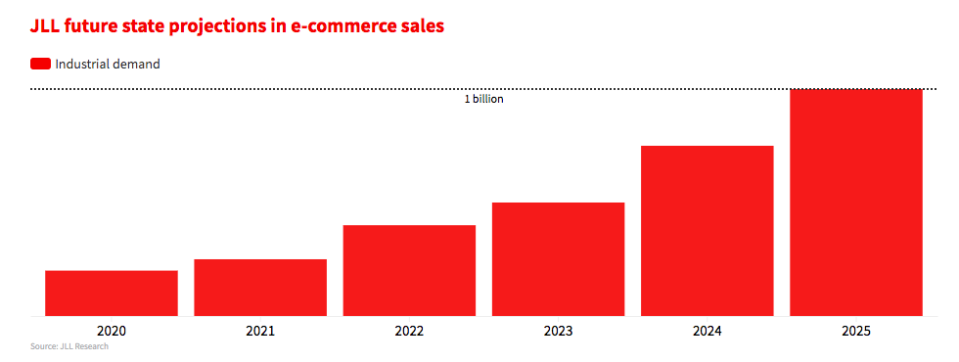This commercial property type is booming during COVID-19
Warehouses, fulfillment centers and other industrial properties are the one bright spot in the commercial real estate industry, which has otherwise been pummeled by the coronavirus pandemic.
Industrial investments and developments are expected to be the best-performing commercial real estate asset through at least 2021, according to a new report by PwC, a London-based professional services network.
“The fact that e-commerce still has a long runway for growth makes industrial real estate the darling of the commercial real estate industry,” said a statement by Craig Meyer, president of industrial services at JLL, a Chicago-based commercial real estate services company.

By 2024, total returns on industrial properties are projected to be 1.6%, 2.8% and 5.1% more lucrative than apartment, office and retail investments, respectively, according to the Pension Real Estate Association’s consensus forecast.
Industrial property values were up 7.4% in September compared to the same time last year, a rate that matches historical annual appreciation. Meanwhile, commercial property values overall rose only 1.4% annually thanks to office and retail depreciation (1.5% and 5.3%, respectively, year-over-year), which dragged down industry averages to the slowest price growth rate since the last commercial real estate price crash in 2010, according to Real Capital Analytics’ commercial property price index.

As department store sales fall over 60%, analysts project e-commerce sales will grow 20% by the end of 2020. Analysts predict e-commerce sales could hit $1.5 trillion by 2025, adding 1 billion square feet of demand for warehouse space by 2025, according to JLL.
On top of the rise of e-commerce during the pandemic, coronavirus-related supply chain issues are causing warehouse owners to store up inventory to hedge against future disruptions — creating even more demand for storage space, according to UBS. The trend could lead to a 400 million square foot increase in demand over the next couple years, according to Prologis Research.
“We assume that industrial sees the smallest decline in occupancy levels but eventually rebounds to previous levels, or possibly higher, as booming e-commerce leads to increased demand for industrial and logistics space,” said UBS.
Sarah Paynter is a reporter at Yahoo Finance.
Read the latest financial and business news from Yahoo Finance
Follow Yahoo Finance on Twitter, Facebook, Instagram, Flipboard, SmartNews, LinkedIn, YouTube, and reddit.
More from Sarah:
This startup allows you to custom build your home virtually
Millionaires aren’t selling their luxury homes in the city: Coldwell Banker
